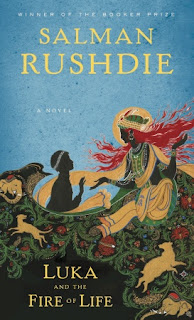Luka and the Fire of Life Review


Haroun and the Sea of Stories is one of my favorite books from my college Humanities courses. It was part of my assigned readings and I had enjoyed the book so much that I made sure to have a better copy of it later in life. While I never finished reading The Satanic Verses, I found this forray into young adult writing turned out quite beautifully.
I don't think most of us Haroun readers would have ever expected Rushdie to return to this Magical World with a sequel but, but that's exactly what he ended up doing with Luka and the Fire of Life. But that's exactly what this book is, in essence, although it written in such a way that it's not exactly required to have read the first book in order to enjoy this one. We're just brought to a generally familiar world with some of the familiar characters from the first book.
As is the way of sequels, I didn't quite enjoy this book as much as the first one. This is not to say that it's a bad book on its own - but in comparison with the first, it wasn't quite there. Then again, one also has to recognize that Haroun has had more time to peculate in my fading memory and thus may only seem better through the tinted vision of hindsight. It's hard to be compared to a book that has already taken a special place in your heart, after all.
Synopsis: Luka and the Fire of Life was written by Saman Rushdie as a sequel to his prior young adult adventure Haroun and the Sea of Stories. The book was released about 20 years after the first title.
This time around the book has Luka, Haroun's younger brother, as the protagonist of our tale. His father, the Shah of Blah Rashid Khalifa falls into a very deep coma sometime after Luka manages to curse a cruel circus master. The curse results in the loss of his circus and freedom for the many animals that he had treated poorly. The only two that remain are a dog named Bear and a bear named Dog, who eventually go to Luka and become his pets. However in a surprise act of revenge, the circus master executes his own brand of revenge that plunges Rashid into a deep sleep that he may never way up from.
He then sees a man outside their home that appears to be his father, but naturally that's not possible given he's still in a deep sleep. He pursues the man and manages to cross over into the realm of Magic, and thus he learns that the doppelganger of his father is an entity known as Nobadaddy who is there to claim Rashid's soul once the mystery disease takes his life. If Luka has any chance of saving his father, the only way seems to be to venture deep into the Magical Word and seek out the mythical Fire of Life that might be able to bring his father back from the jaws of death. But at least he has Dog and Bear with him, now can now speak since they've crossed over into the world of magic.
Now this book was deliberately patterned after video games as seen in the need for Luka to be careful of how many lives he has left as he journeys to the Fire of Life and the presence of "save points" at the end of every "level" as marked by a series of challenges successfully surmounted. Saving is important since it allows him to resume his game at the last save point as is similar in video games. This effort to include a relatively modern twist to the narrative flow was clearly an attempt to help make the story a bit more relatable for its younger audience but at the same time I felt it ended up taking away from some of the wonder of the world. The first book had Haroun going through a magical journey through stories, myths and allegories. This one had...save points.
For some reason the book ended up feeling a lot like the story of The Wizard of Oz or something. There was that distinct questing feeling as Luke gathered more and more allies who all offered to help him achieve his final objective, even though "everyone knew" that to steal the fire of life was nearly impossible. Through in the odd pitfall and challenge and you get your little adventure, thus it remains a very basic story premise.
Of course like Rushdie's other works, there are deeper nuances of meaning hidden behind a lot of the characters, which is always a good thing. The book still offers a lot to older readers who want a glimpse at his thinking and the sort of commentary he wants to make. But at the same time a lot of the tokens, imagery and extensive punning sort of turn one away from deeper analysis since it feels more and more like a romp through Piers Anthony's Xanth or something.
Maybe my love for Haroun's adventure had me setting somewhat unfair expectations for this follow-up title. Perhaps I was so earnest in wanting a story that had the same style of magical adventuring that it severely affected my ability to take this book as it was. But such things are unavoidable in the reading world, I suppose.
Luka and the Fire of Life is a strong enough title on its own and is still an enjoyable read. It didn't strike me as quite as thought-provoking as the first book had but it remains quite worthy of respect. Thus it still gets 3 forgotten gods of old wandering around the magical world out of a possible 5.